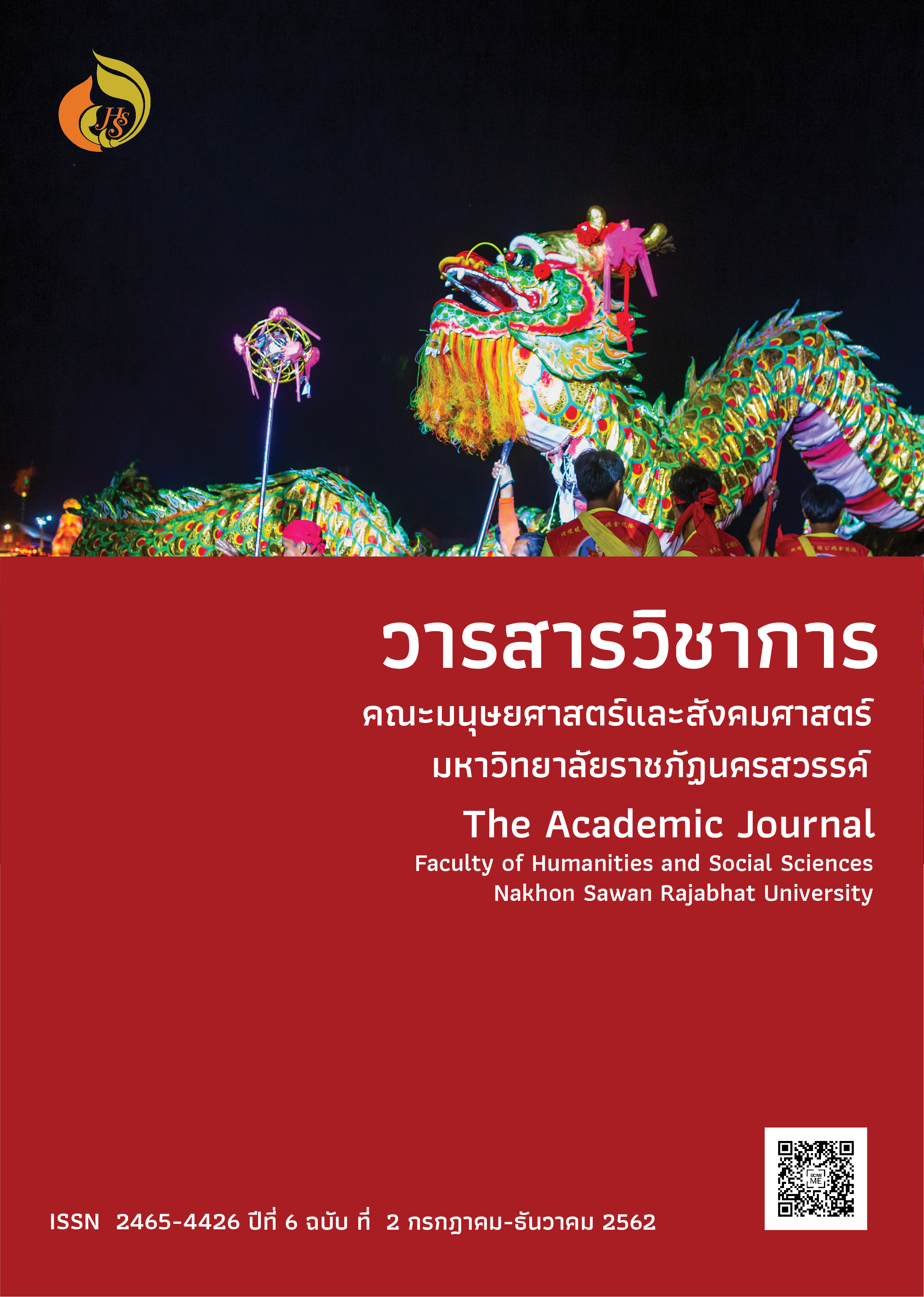Thai Dramatic Dance affecting the Tourists’ Behavior in Heritage Tourism Nakhonsawan Province
Main Article Content
Abstract
The present study aimed to study the factors affected towards tourists’ behaviour in a particular tourist attraction and the forms of dancing art affected towards the tourists’ behaviour. The study was done with the means of mix method between quantitative and qualitative method. The samples were 1,803,791 Thai tourists who found at various tourist attraction in Nakhon Sawan in 2018 The samples were defined by estimating observable variable as 1: 20. The 180 samples were chosen with sample random sampling of the tourists at 16 tourist attractions in Nakhon Sawan. Then, the check and confirmation were done with in - depth interview of the administrators in the government and private agency which concerns about dancing art and tourism by purposive sampling as 16 people. The data were analysed with descriptive statistics, structural equation model and confirmatory factor. The result showed that
- The factors ; affected the tourists’ behaviour in terms of community way,
community culture, community custom and community history were reliable and had statistically significant consistency. Community culture was the most reliable, on the other hand, community custom was the least reliable in all reliables. The analysed results of behaviour elements of the tourists concerning the aspects of the return, making recommendation, tourist attraction, tourist service and tourist market were reliable and had statistically significant consistency. Tourists’ behaviour with the return was highly reliable while the aspect of tourist service was less reliable.
2. The forms of dancing art performance affected the tourists’ behaviour concerning the presentation of the origins of community culture was the most impressive and also had influence on the tourists. Moreover, there should be the performance form of the changing community or society context . The performance of dancing art, therefore, plays an important role towards being part of tourism promotion in the province. As the related organisation including government sector, private sector and community can adjust the performance of classical dancing, it will be considerably beneficial to tourist attraction. The activities concerning community culture can best attract the tourists’ behaviour to let them willingly visit the places again and also publicise via the various kinds of social media.
Article Details
References
วารสารนักบริหาร มหาวิทยาลัยกรุงเทพ, 32(4), 139.
จุฑามาศ คงสวัสดิ์. (2550). การศึกษาแนวทางการส่งเสริมการท่องเที่ยวเชิงวัฒนธรรมจังหวัดนครปฐม.
นครปฐม: ภาควิชาพื้นฐานทางการศึกษา มหาวิทยาลัยศิลปากร.
ณรงค์ กุลนิเทศ, และสุดาวรรณ สมใจ. (2558). ระเบียบวิธีวิจัยชั้นสูง และการออกแบบวิจัย.
(พิมพ์ครั้งที่ 2). กรุงเทพ: มาสเตอร์พรินท์ สามเสน.
นุชนารถ รัตนสุวงศ์ชัย. (2554). กลยุทธ์การพัฒนาการท่องเที่ยวเชิงวัฒนธรรม. วารสารมนุษยศาสตร์,
18(1), 32-33.
ประภาศรี ศรีประดิษฐ์ รุ่งนภา ฉิมพุฒ. (2551). การศึกษาวิเคราะห์นาฏศิลป์พื้นบ้านเขตภาคเหนือ
ตอนล่าง: กรณีศึกษาจังหวัดนครสวรรค์และอุทัยธานี (รายงานผลการวิจัย). พิษณุโลก:มหาวิทยาลัยนเรศวร.
ประวิทย์ ฤทธิบูลย์. (2558). นาฏศิลป์ไทย: สื่อทางวัฒนธรรมที่มีกว่าความบันเทิง. สืบค้น 29 มีนาคม
2560, จาก http://www.repository.rmutt.ac.th/handle/123456789/2288
เยาวลักษณ์ ใจวิสุทธิหรรษา และคณะ.(2552). บทบาทนาฏยศิลป์เพื่อส่งเสริมที่ท่องเที่ยว อุทยาน
ประวัติศาสตร์กำแพงเพชร เมืองมรดกโลก. สักทอง : วารสารมนุษยศาสตร์และสังคมศาสตร์, 15(2).
กระทรวงการท่องเที่ยวและกีฬา. (2552). แผนการตลาดเร่งด่วนเพื่อฟื้นฟูภาพลักษณ์และกระตุ้น
การท่องเที่ยว ปี 2552. สืบค้น 29 มีนาคม 2560, จาก http://www.webboard.bangkoktourguide.net/webboard/index.php?topic=1695.0
สำนักงานพัฒนาการท่องเที่ยว. (2549). การพัฒนาการท่องเที่ยวที่ยั่งยืน. สืบค้นเมื่อ 7 พฤศจิกายน
2559, จาก http://www.tourism.go.th.
Richards, Greg. (2007). Cultural Tourism: Global and Local Perspectives. Binghamton:
The Haworth Press.


